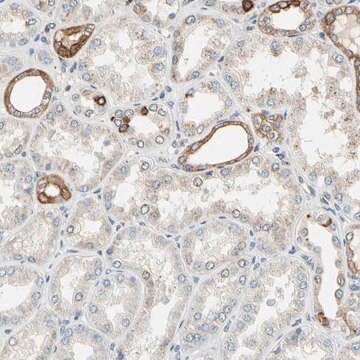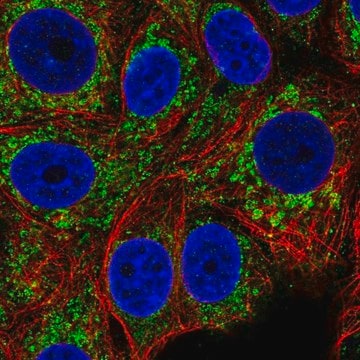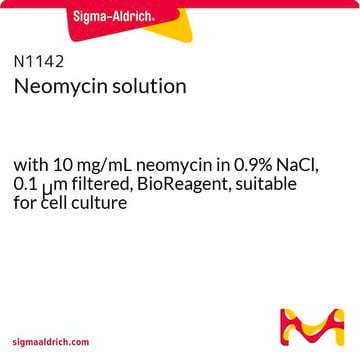MABN688
Anti-PTH1R Antibody, clone 4D2
ascites fluid, clone 4D2, from mouse
Sinónimos:
Parathyroid hormone 2 receptor, PTH2 receptor, PTH1R
About This Item
Productos recomendados
biological source
mouse
Quality Level
antibody form
ascites fluid
antibody product type
primary antibodies
clone
4D2, monoclonal
species reactivity
human
technique(s)
immunocytochemistry: suitable
immunohistochemistry: suitable
isotype
IgG1
NCBI accession no.
UniProt accession no.
shipped in
wet ice
target post-translational modification
unmodified
Gene Information
mouse ... Pth1R(19228)
General description
Immunogen
Application
Immunocytochemistry Analysis: A 1:200-1,000 dilution from a representative lot detected PTH1R in SK-BR-3 cells.
Optimal working dilutions must be determined by end user.
Neuroscience
Developmental Neuroscience
Quality
Western Blotting Analysis: A 1:500-2,000 dilution of this antibody detected PTH1R-hIgGFc transfected HEK293 cell lysate.
Target description
Physical form
Storage and Stability
Handling Recommendations: Upon receipt and prior to removing the cap, centrifuge the vial and gently mix the solution. Aliquot into microcentrifuge tubes and store at -20°C. Avoid repeated freeze/thaw cycles, which may damage IgG and affect product performance.
Analysis Note
PTH1R-hIgGFc transfected HEK293 cell lysate
Disclaimer
¿No encuentra el producto adecuado?
Pruebe nuestro Herramienta de selección de productos.
Storage Class
12 - Non Combustible Liquids
wgk_germany
nwg
flash_point_f
Not applicable
flash_point_c
Not applicable
Certificados de análisis (COA)
Busque Certificados de análisis (COA) introduciendo el número de lote del producto. Los números de lote se encuentran en la etiqueta del producto después de las palabras «Lot» o «Batch»
¿Ya tiene este producto?
Encuentre la documentación para los productos que ha comprado recientemente en la Biblioteca de documentos.
Nuestro equipo de científicos tiene experiencia en todas las áreas de investigación: Ciencias de la vida, Ciencia de los materiales, Síntesis química, Cromatografía, Analítica y muchas otras.
Póngase en contacto con el Servicio técnico





